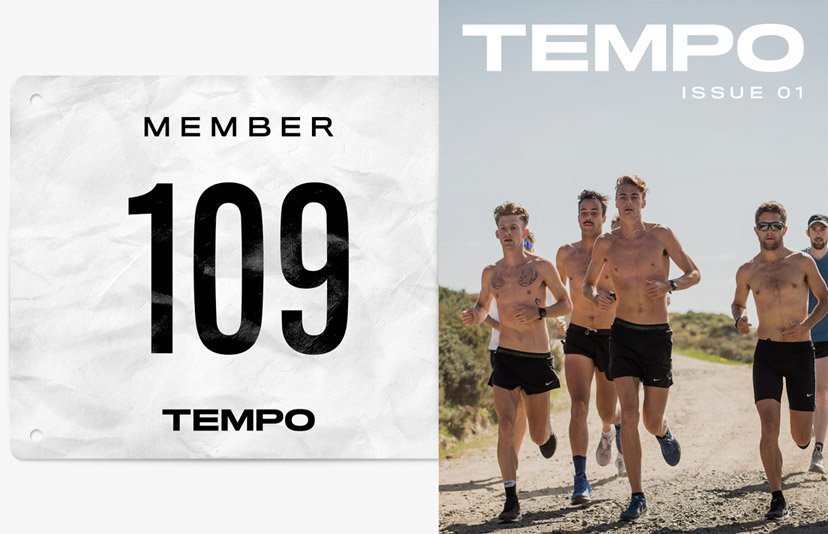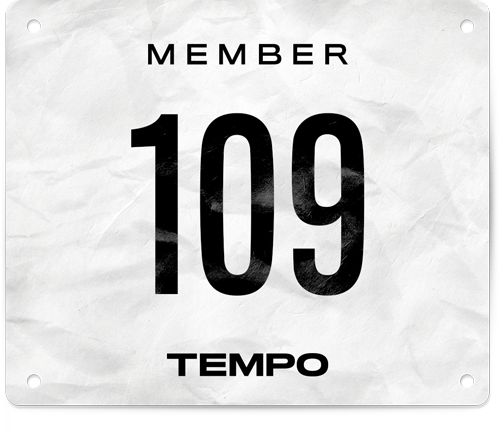Culture
ON THE BRIGHTEST STAGE
Matt Luke Meyer went from bombing auditions to being a main player in NYC
Venture the streets of New York City and you will find it’s easier to blend into the homogenous throng of passers-by hailing taxis, stumbling down subway stairwells, and jaywalking across pot-holed avenues than it is to distinguish yourself amidst the pandemonium. After all, in today’s technological age personal recognition is more likely to surface across social media channels rather than in-person interaction. How then, through the static and the noise of this ultimate concrete jungle, can anyone differentiate themselves? Further, how can anyone become an icon of their community without resorting to strutting along Times Square in a pair of white briefs and playing a guitar?
One possible answer can be found quite literally in the lifestyle of the runner, a lifestyle that moves in alignment with the New York minute. New Yorkers are addicts for the city’s swift pace, and the New York minute provides a means for such a pace to be measured; a pace which one famous American late-night television host jokingly defined as the interval between a Manhattan traffic light turning green and the guy behind you honking his horn. It is fitting then, that in a city which champions a mindset centered upon being first for the sake of being first, that running would play a vital role in shaping both the identity of the city as well as the plethora of runners who choose to partake in the sport.
Perhaps the most symbolic representation of the relationship between the city and the sport comes each November, with the running of the New York City Marathon; a day where fifty thousand runners cover 26.2 miles and, in the process, unite the five boroughs that compose it. How might one possibly stand out in a wondrous assemblage of singlets, short shorts, and spandex? Run fast. Run very fast. 154 New York minutes to be exact.
Last November, if you found yourself amongst the myriad spectators along the course, one such individual - albeit a quick one - likely caught your eye. That is, if you didn’t blink at the wrong moment and miss him. Give him only a quick first glance and you may have mistook his vibrant pink hued singlet and tinted wayfarers for the modern-day Energizer Bunny – indeed when you meet him for the first time you may conclude that he is the reincarnation of such. If you sat beside the finish line, atop the bleachers in Central Park, the identity of the bristly bearded racer was unmistakably apparent when announced over the public address system. A name that rolls off the tongue as gracefully as his stride along Tavern on the Green. Three names often pronounced as one unified entity. [Matthew Luke Meyer](https://www.instagram.com/matthewlukemeyer/?hl=en).
Matthew Luke Meyer is an embodiment of the New York running scene; he is not only an athlete but a coach, instructor, and coordinator – a fixture in all facets of the local community. As a coach for Streets 101, a run club built on communal effort and commitment, he creates an environment that promotes athletes sharing in one another’s success. As an instructor at Mile High Run Club and Custom Performance Physical Therapy, he inspires his classes to find glory in the daily grind. He hopes that through that process they may discover that running is more than just running, it’s a metaphor for life. As a coordinator for Take the Bridge, Matt looks after community outreach for the ever-popular race series.
But titles can be misleading; they represent just fractions of Matt’s identity. His altruistic tendencies, a beacon to everyone he meets, tend to shine the proverbial spotlight on the runners surrounding him rather than fixate such exposure towards himself. This being so, one should look to his athletes and the smiles, breakthroughs, and emotional highs they effuse in order to better understand Matt. After all, it is their success which fuels his very own.
Similar to his coaching philosophy, his achievements as an athlete are just as much theirs as they are his - a sharp contrast to his previous career, one that placed emphasis on individual success above all others.
Matt studied Theatre Arts and Dance at Northern Colorado University, where he was routinely cast in the center stage – perhaps foreshadowing his present role as the protagonist in the NYC running community. Upon graduating, his passion for theatre and the performing arts led him to New York City, where he chased audition after audition, often having nothing to show for his efforts other than rejection and heartache. He felt far from being the king of Queens and more like the jester who endlessly performs so that he may earn the slightest bit of the royal court’s recognition.
Day after day, audition after audition, he found that his simple steadfast approach was bearing little success, as he recalled “You can bring in your absolute, one hundred percent best and at the end of the day that’s not what (the casting directors) want.” In other words, the audition process exudes an air of subjectivity; an idea Matt struggled with.
“I was really bad at separating (the subjectivity) from what I thought about myself and what I thought about how I was in the craft and the arts.” No matter how prepared he was, no matter how much work he put into his audition, his best was not enough. He was becoming so engrossed in playing the characters the auditions sought that in the process he was beginning to lose a sense of who he actually was. He had no results to show for his effort, other than that he was unhealthy and unhappy.
And so he began to run.
Initially, running offered Matt an emotional outlet rather than the social outlet it would later provide. He found that the more miles he ran, the more he began to like himself. One mile turned into two, two into three, and so the pattern goes. Running increasingly took priority of his daily routine. More miles, less auditions. He no longer listened to the casting director, he listened to himself.
“You put in work, you carve out time, you set a goal and you can slowly make your way towards whatever that goal may be,” Meyer explains, “No one can decide that they really liked your effort but it really wasn’t what they were looking for that day.” No matter how hard or complicated life got, running would remain simple, “The clock is the only thing at the end of the day, and there is no opinion involved.”
“[Without running] I felt that I was just riding along with life, not really sure where it was going. But running gave me a way to move into the driver’s seat. Every day I’m waking up with a goal, something I personally WANT to accomplish, not just something that I have to do. That’s translated into the rest of life.”
Matt Luke Meyer
It is no surprise Matt’s running ambitions are as lofty as his acting ones were. After all, both disciplines require the same courageous approach. “I think that I was able to take risks in acting, even if it would totally bomb and I’d fall flat. I think I’ve been able to carry that into my running. Got to risk it for the biscuit. I feel there’s plenty of other places in your life to make reasonable and safe choices, not running. I don’t run a marathon as fast as I can because it’s reasonable. No, running is where you realize you can be brave and take risks. You might surprise yourself.”
And surprise himself he did.
In his first marathon he covered the arduous distance in 2 hours and 57 minutes. A Boston Qualifier. Nearly a year later he followed his Philadelphia feat with a 15-minute personal best at the Chicago Marathon, 2 hours and 42 minutes. But he was not done yet, he never is. Just months after Chicago, Matt improved his marathon mark at the Boston Marathon, completing the famed course in 2 hours and 39 minutes. An avid fan of the sport, role models like Scott Fauble have helped Matt develop the mentality necessary to motivate himself in the marathon. “(Scott) would tell himself ‘I belong on this team, bet on yourself’ and that has come in a lot for me recently, when I find myself in a race looking around at all these other amazing runners and start doubting my ability I really lean on those phrases.”
"I feel there’s plenty of other places in your life to make reasonable and safe choices, not running. I don’t run a marathon as fast as I can because it’s reasonable. No, running is where you realize you can be brave and take risks. You might surprise yourself.”
Matt Luke Meyer
Three years into his marathon career, Matt was ready for a homecoming at the New York City marathon. He hadn’t raced the course, but the majority of it was familiar to him, and many of its miles had been covered in his recent past.
The New York City marathon is unlike any of the other world majors; it is a runner’s urban playground that comprises several intimidating bridges, hints of greenspace, and an elevation profile that can’t be underestimated. Attempt to take too big a bite of the Big Apple and more times than not you will end up choking.
“When I get to those dark places in a race, I want to be comfortable and familiar with that suffering. To have spent enough time there during the training cycle that by the time I get to the race, I can say that I already bought the ticket, checked into my hotel, kicked back in a comfy chair. It might be down in hell, but I’ve spent some time getting comfortable with it.”
In the days preceding the first Sunday of last November, a friend from the west coast, Peter Bromka, posted a photo to Instagram with a caption meant to motivate Matt. Bromka wrote, “Tomorrow Matt must fight his strongest impulse to give, and for precious few hours he must take. He must cash in on all that energy he emits each day, and grasp for glimpses of anything he can find over the final miles into the Park.”
Fueled by Bromka’s words of encouragement and with the vitality of his beloved city, Matt raced through the five boroughs, his mind fixated on the finish and his heart empowered by his friends and family. “Running has been a catalyst for me to keep finding growth in the rest of my life, and I really have seen that in my relationship with my parents. Knowing I was coming through the finish line of the marathon this year as the best version of myself, and having my parents see me like that, it was incredible. I don’t think they’ve ever been more proud.”
“Tomorrow Matt must fight his strongest impulse to give, and for precious few hours he must take. He must cash in on all that energy he emits each day, and grasp for glimpses of anything he can find over the final miles into the Park.”
Peter Bromka
2 hours 34 minutes and 40 seconds. 5 minute and 3 second personal record.
Not only are his parents proud, the entire city of New York is as well.
“[Marathon] Sunday was a beautiful lesson in patience, suffering, joy and strength. And with that a huge step in the direction I know I’m capable of,” Meyer wrote to his Instagram followers after collecting his thoughts and reflecting on his race day. As a man who fears unfulfilled potential and who participates in a sport that is never at a lack for initials, Matt has set his ambition upon a new goal, one that is not spelt as “BQ” but rather as “OTQ.”
“Running gave me the opportunity to do something bigger. So, every day I can take big chances because I have no idea where the limit is. I’m going to keep reaching until I find it. I have not found anything that has broken me yet.”


